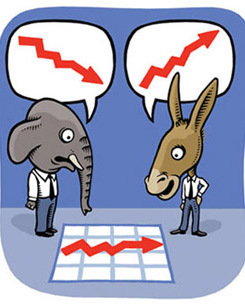 loading
loading
FindingsPocketbook politics Gregory NemecView full imageHow voters think the economy is doing—and how likely they are to spend their cash—may depend less on hard data and more on their own political leanings. “When your political team is in charge, you tend to believe that the economy will do better,” says Gregory A. Huber, an associate professor of political science. “Not only do people say this kind of thing in surveys, they also appear to change their consumption behavior to match their partisanship.” Huber and Alan S. Gerber ’86, a professor of political science, analyzed data on 2,000 people who voted in the 2006 congressional elections, when Democrats took over control of both the House and Senate. Each voter was surveyed twice: once in October and once shortly after the vote in November. Neither the state of the economy nor the composition of Congress changed in the interval between the two surveys, Huber points out. “But after the election, Democrats said they planned to increase future vacation spending by an average of $286 from the $1,400 pre-election figure.” Among Republicans, spending forecasts dropped. (Huber and Gerber’s study appeared in the American Journal of Political Science.) A companion study by the pair, published in the American Political Science Review, found a similar pattern in county-level quarterly sales tax revenues during political shifts: the data showed that winners spent more, and losers spent less. “Partisanship colors your evaluation of the economy,” says Huber, “and people definitely act on those perceptions.”
The comment period has expired.
|
|